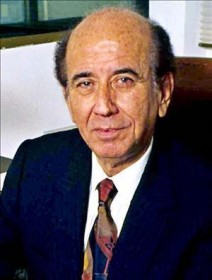CARACAS, (Reuters) – Former Venezuelan President Carlos Andres Perez, who survived two coup attempts but was finally forced from office as the first Latin American leader to be convicted of corruption, died yesterday in Miami.
The 88-year-old served as the South American country’s president between 1974 and 1979, and again between 1989 and 1993. Independent Venezuelan broadcaster Globovision said he died at Miami’s Mercy Hospital of a heart attack.

“(His death) came as a surprise. He woke up today in very good spirits,” his daughter Maria Francia told Globovision.
Perez’s first term in power was marked by a massive inflow of petrodollars that saw the OPEC member nicknamed “Saudi Venezuela” by some, while his second was marred by corruption scandals, coup bids and the violent suppression of protests.
He became the first leader in Latin America to be convicted of graft and was forced out of office in May 1993, seven months before completing his second term.
He was sentenced to 28 months for the misappropriation of $17 million in public funds. He served the first few months at a low security jail in the capital Caracas, then was allowed to spend the rest of his term under house arrest due to his age.
In his last years, he lived in Miami and was an occasional but fierce critic of the leftist policies of Venezuela’s current president, Hugo Chavez, who once tried to topple him.
Perez had been elected by a landslide for his second term, but his presidency was rocked by price riots and two coup attempts as he tried to push through tough economic reforms.
The so-called Caracazo riots in 1989, which were triggered by a package of strict International Monetary Fund-backed fiscal measures, became a landmark human rights case after Perez sent troops into the streets who fired indiscriminately on crowds of demonstrators.
In 1992, Chavez — then a young paratroop officer — led a botched but bloody coup attempt against the president.
Chavez was jailed for two years as a result, but his brief televised surrender speech in which he took responsibility for the insurrection made him famous.
Since winning a presidential election in 1998, Chavez has often cited the Caracazo riots as providing the political roots for his own socialist “revolution” to help Venezuela’s poor.





